Related Research Articles

Genetics is the study of genes, genetic variation, and heredity in organisms. It is an important branch in biology because heredity is vital to organisms' evolution. Gregor Mendel, a Moravian Augustinian friar working in the 19th century in Brno, was the first to study genetics scientifically. Mendel studied "trait inheritance", patterns in the way traits are handed down from parents to offspring over time. He observed that organisms inherit traits by way of discrete "units of inheritance". This term, still used today, is a somewhat ambiguous definition of what is referred to as a gene.
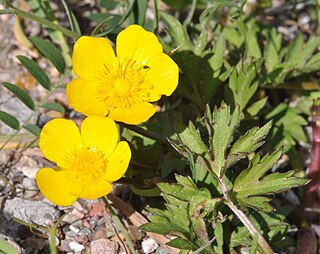
Flowering plants are plants that bear flowers and fruits, and form the clade Angiospermae. The term 'angiosperm' is derived from the Greek words ἀγγεῖον / angeion and σπέρμα / sperma ('seed'), meaning that the seeds are enclosed within a fruit. The group was formerly called Magnoliophyta.
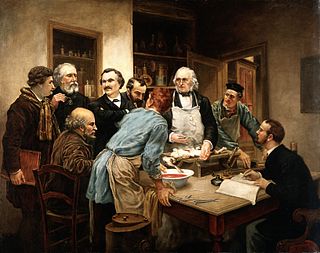
Physiology is the scientific study of functions and mechanisms in a living system. As a subdiscipline of biology, physiology focuses on how organisms, organ systems, individual organs, cells, and biomolecules carry out chemical and physical functions in a living system. According to the classes of organisms, the field can be divided into medical physiology, animal physiology, plant physiology, cell physiology, and comparative physiology.
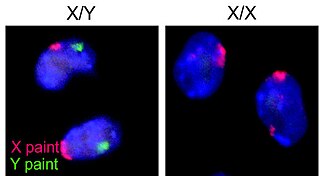
Sex is the biological trait that determines whether a sexually reproducing organism produces male or female gametes. During sexual reproduction, a male and a female gamete fuse to form a zygote, which develops into an offspring that inherits traits from each parent. By convention, organisms that produce smaller, more mobile gametes are called male, while organisms that produce larger, non-mobile gametes are called female. An organism that produces both types of gamete is hermaphrodite.
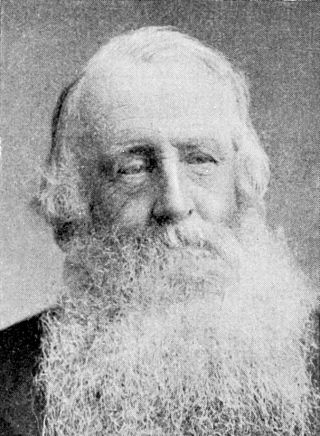
Edward Augustus Freeman was an English historian, architectural artist, and Liberal politician during the late-19th-century heyday of Prime Minister William Gladstone, as well as a one-time candidate for Parliament. He held the position of Regius Professor of Modern History at Oxford, where he tutored Arthur Evans; later he and Evans were activists in the Balkan uprising of Bosnia and Herzegovina (1874–1878) against the Ottoman Empire.

The Marchantiophyta are a division of non-vascular land plants commonly referred to as hepatics or liverworts. Like mosses and hornworts, they have a gametophyte-dominant life cycle, in which cells of the plant carry only a single set of genetic information. The division name was derived from the genus name Marchantia, named by French botanist Jean Marchant after his father.
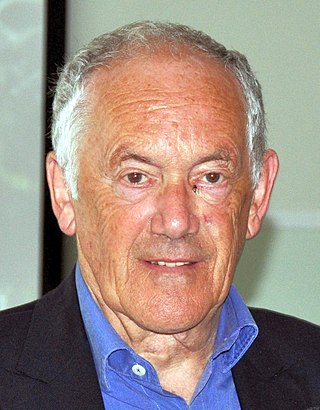
Peter William Atkins is an English chemist and a Fellow of Lincoln College at the University of Oxford. He retired in 2007. He is a prolific writer of popular chemistry textbooks, including Physical Chemistry, Inorganic Chemistry, and Molecular Quantum Mechanics. Atkins is also the author of a number of popular science books, including Atkins' Molecules, Galileo's Finger: The Ten Great Ideas of Science and On Being.

Radiata or Radiates is a historical taxonomic rank that was used to classify animals with radially symmetric body plans. The term Radiata is no longer accepted, as it united several different groupings of animals that do not form a monophyletic group under current views of animal phylogeny. The similarities once offered in justification of the taxon, such as radial symmetry, are now taken to be the result of either incorrect evaluations by early researchers or convergent evolution, rather than an indication of a common ancestor. Because of this, the term is used mostly in a historical context.
In biology, adaptation has three related meanings. Firstly, it is the dynamic evolutionary process of natural selection that fits organisms to their environment, enhancing their evolutionary fitness. Secondly, it is a state reached by the population during that process. Thirdly, it is a phenotypic trait or adaptive trait, with a functional role in each individual organism, that is maintained and has evolved through natural selection.
The philosophy of biology is a subfield of philosophy of science, which deals with epistemological, metaphysical, and ethical issues in the biological and biomedical sciences. Although philosophers of science and philosophers generally have long been interested in biology, philosophy of biology only emerged as an independent field of philosophy in the 1960s and 1970s, associated with the research of David Hull. Philosophers of science then began paying increasing attention to biology, from the rise of Neodarwinism in the 1930s and 1940s to the discovery of the structure of DNA in 1953 to more recent advances in genetic engineering. Other key ideas include the reduction of all life processes to biochemical reactions, and the incorporation of psychology into a broader neuroscience.

Garrett James Hardin was an American ecologist and microbiologist. He focused his career on the issue of human overpopulation, and is best known for his exposition of the tragedy of the commons in a 1968 paper of the same title in Science, which called attention to "the damage that innocent actions by individuals can inflict on the environment". He is also known for Hardin's First Law of Human Ecology: "We can never do merely one thing. Any intrusion into nature has numerous effects, many of which are unpredictable."
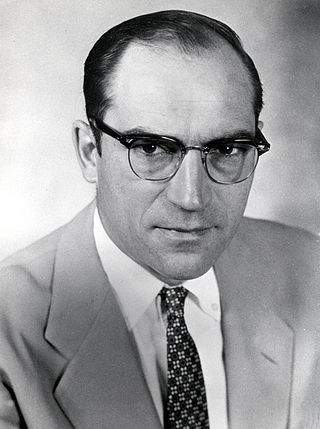
Luna Bergere Leopold was a leading U.S. geomorphologist and hydrologist, and son of Aldo Leopold. He received a B.S. in civil engineering from the University of Wisconsin in 1936; an M.S. in physics-meteorology from the University of California, Los Angeles in 1944; and a Ph.D. in geology from Harvard University in 1950.

Ernest Everett Just was a pioneering biologist, academic and science writer. Just's primary legacy is his recognition of the fundamental role of the cell surface in the development of organisms. In his work within marine biology, cytology and parthenogenesis, he advocated the study of whole cells under normal conditions, rather than simply breaking them apart in a laboratory setting.

Biology is the scientific study of life. It is a natural science with a broad scope but has several unifying themes that tie it together as a single, coherent field. For instance, all organisms are made up of at least one cell that processes hereditary information encoded in genes, which can be transmitted to future generations. Another major theme is evolution, which explains the unity and diversity of life. Energy processing is also important to life as it allows organisms to move, grow, and reproduce. Finally, all organisms are able to regulate their own internal environments.
Garland Science was a publishing group that specialized in developing textbooks in a wide range of life sciences subjects, including cell and molecular biology, immunology, protein chemistry, genetics, and bioinformatics. It was a subsidiary of the Taylor & Francis Group.
David Mark Hillis is an American evolutionary biologist, and the Alfred W. Roark Centennial Professor of Biology at the University of Texas at Austin. He is best known for his studies of molecular evolution, phylogeny, and vertebrate systematics. He created the popular Hillis Plot depiction of the evolutionary tree of life.
Viktor Hamburger was a German-American professor and embryologist. His collaboration with neuroscientist Rita Levi-Montalcini resulted in the discovery of nerve growth factor. In 1951 he and Howard Hamilton published a standardized stage series to describe chicken embryo development, now called the Hamburger-Hamilton stages. He was considered "one of the most influential neuroembryologists of the twentieth century".

Gunther Siegmund Stent was a graduate professor of molecular biology at the University of California, Berkeley. An early bacteriophage biologist, he was known also for his studies on the metabolism of bacteria and neurobiology of leeches, and for his writing on the history and philosophy of biology.
John Tooze FRS was a British research scientist, research administrator, author, science journalist, former executive director of EMBO/EMBC, director of research services at the Cancer Research UK London Research Institute and a vice president at The Rockefeller University.
References
- ↑ Purves, William K. (1983). Life: The Science of Biology (1st ed.). W. Grant Press. p. 1182. ISBN 9780716798569.